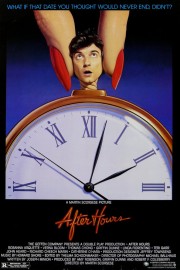After Hours
It’s easy to see why Martin Scorsese fans have affection for his shaggy 1985 film, “After Hours.” Made after not just the failure of “The King of Comedy,” but his first attempt to make “The Last Temptation of Christ” fell apart, this weird, wild tale feels like a dividing point in his career in terms of how he told stories and made films. It’s impossible not to just get sucked in by the film from frame one.
The film stars Griffin Dunne as Paul Hackett. When we first meet him, he’s a word processor helping a coworker with his work. He leaves for the day, and he meets an interesting woman named Marcy (Rosanna Arquette), who lives in SoHo with an artist roommate, Kiki (Linda Fiorentino). Paul is immediately fascinated by Marcy, and gets her number, and calls him up when he gets home. He goes to meet her at her apartment, and the taxi ride there is just the beginning of a strange night wherein his life, and sense of self, will be flipped upside down.
If you’ve spent any amount of time in a major city, it’s likely that you’ve had times where you’ve been downtown, on your own, and seen, or been frightened about, the prospect of danger or bizarre things happening. I know I had some such thoughts when I was in downtown Atlanta during college, but nothing like what Paul goes through here. The screenplay is by Joseph Minion, and it was written for his graduate studies at Columbia University, where he received an A for it. Scorsese was given the script by Dunne and his producing partner, Amy Robinson, and he took it because he wanted to get back to something akin to pure cinema, fast cinema. It was the perfect tonic for the great filmmaker after the disappointments he had just experienced, and the energy that he felt for the project comes through in every frame.
I think the first time I really was aware of what type of movie “After Hours” was was when Roger Ebert likened the strange, sexual odyssey of Kubrick’s “Eyes Wide Shut” to the film when he reviewed it in 1999, and I can completely see the comparisons, because Paul’s journey follows a lot of similar paths through lust, crime and dark comedy with characters both shady and sweet. Dunne, best known otherwise for his supporting role in “American Werewolf in London,” is terrific in the role, with comedic chops to embrace the absurdity that follows Paul in this film, along with a humanity that makes us care when things get really crazy after he finds himself broke, in the rain, just trying to get home after things don’t go well between he and Marcy. Those initial scenes between Paul and Marcy, and Paul and Kiki, set the tone for the surreal evening Paul will find himself in, and Scorsese gets wonderful work out of Arquette and Fiorentino, with both playing key roles in the night Paul has, and not in the way we expect at the outset. I was a bit shocked by how many people I recognized in this movie, though, beyond the two leads. I knew from other people talking about it that John Heard (the dad from “Home Alone”) was in it briefly, and he is great in his scenes as a bartender who tries to help Paul, but his “Home Alone” wife, Catherine O’Hara, also shows up, as an ice cream vendor who is sweet on him, but also capable of rallying a mob at the drop of a hat. Cheech and Chong show up as a couple of robbers who have been keeping people on edge in SoHo. And who did not warn me of the wonderful Teri Garr was here as a waitress working at the Terminal Bar who is sweet on Paul when he shows up, just wanting to get out of the rain. The film takes some crazy turns, but with actors like these, we get an emotional balance that will keep us engaged, as well as entertained, by the madness Paul finds himself in the middle of in this film.
I don’t know that I love “After Hours” quite as much as some Scorsese fans, but there’s an energy and imagination at work in this film from Marty that is exciting to watch, and reminds me of “GoodFellas” and “The Wolf of Wall Street” in how wickedly fun they are. This was the first film of Scorsese’s shot by Michael Ballhaus, and you immediately see a loose creativity at work in their collaboration here that will continue to later films like “GoodFellas,” and even “The Last Temptation of Christ,” which he got back to making after his next film, “The Color of Money.” Even without considering the place in Scorsese’s filmmography it finds itself, “After Hours” feels like a cathartic work from a filmmaker who was feeling burned out, but got a jolt of energy at the end of a long run to get himself to the finish line. I’ll be really excited to watch it again.










